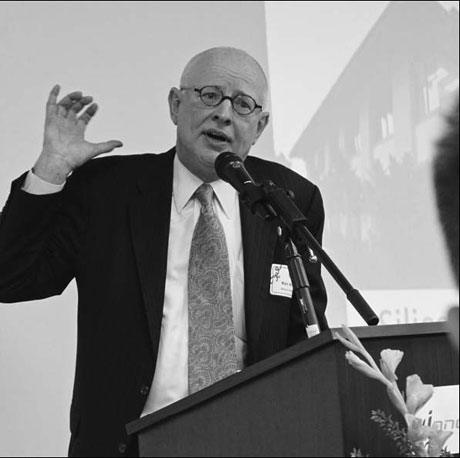2012-04-13 11:28:58.0Zhang Qidong in Santa Clara, CaliforniaFirst US-China tech incubator launches1811040061Home2@usa/enpproperty-->
Ken Wilcox, chairman of Silicon Valley Bank, speaks at InnoSpring's opening ceremony on April 11. Chang Jun / China Daily
InnoSpring, Silicon Valley's first US-China technology startup incubator, officially opened its doors on April 11 to Chinese returnees starting their own companies and American entrepreneurs seeking to enter the Chinese market.
InnoSpring, created from a joint partnership of a consortium of Chinese and American financial institutions - Tsinghua University Science Park, Shui On Group, Northern Light Venture and Silicon Valley Bank - is expected to compete with leading local incubators by providing a full range of services to its beneficiaries.
"Newly inducted incubatees joining InnoSpring's ecosystem can leverage our US-China focus as well as receive customized incubator services," said Eugene Zhang, president of InnoSpring. "Today, we crossed our first milestone and eagerly look forward to building InnoSpring for the long haul."
Twelve technology startup companies have already been selected and will settle into InnoSpring's 1,350-square-meter facility. InnoSpring plans to select 15 companies every six months for its "Seed Program". These companies will receive an initial $25,000 investment at the outset of the program.
The Seed Program is akin to a 6-month boot camp for entrepreneurs who aim to complete a prototype, assemble a core team and conduct initial customer feedback.
Select startups will also have the opportunity to receive additional funds of up to $250,000 in capital from TEEC Angel Fund, bringing the maximum initial investment amount to $275,000.
Ken Wilcox, chairman of Silicon Valley Bank, said the establishment of InnoSpring is a sign of true innovation between China and the US.
"Chinese engineers and high tech professionals have made major contribution to technology innovation in Silicon Valley. The creation of InnoSpring tells us again that innovation has no borders, and most progress can be made where there is collaboration between different parties," he said.
Xia Shuguang with the San Francisco Consul of Economic & Commercial Office described the incubation center as a "nest where future golden eggs are being hatched".
"We will help set up the best incubation platform to help technology startup companies to go through the initial stage of business innovation," said Lei Yang, managing director of Northern Light Venture Capital.
"The life cycle of business starts with innovation. Our goal is to eliminate the globalization barrier and make the Silicon Valley's technology innovation a global innovation," Yang said.
The VC managing director also said InnoSpring can accommodate up to 40 startups in its office space. The company also give access to venture capitalists and angel investors, mentor executives and entrepreneurs, give business and funding advice, provide entrepreneurial workshops and assist in assembling core teams recruiting.
"We also offer cross-border development for US and Chinese startups, and access to Chinese public agencies to facilitate China expansion for US startups, which basically cut all the barriers out for both side to achieve their goals better and faster," Yang said.
Doors open at the first US-China technology incubator in Silicon Valley.


